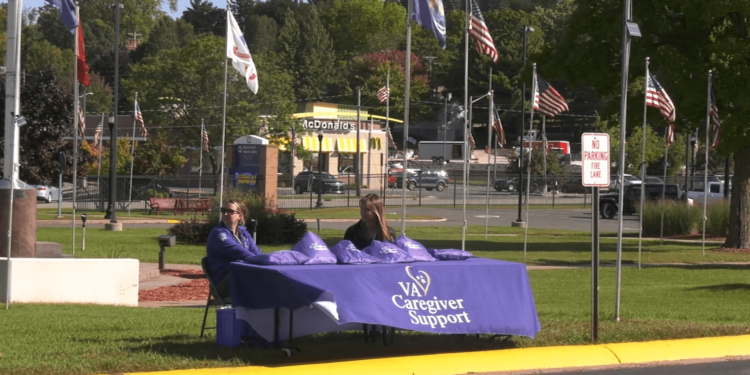IRON MOUNTAIN, Mich. (WZMQ) – Just this year, the Oscar G. Johnson VA Medical Center expanded its domestic violence screening services, and added new programs for women who may have experienced violence. As the hospital celebrates a century of care for women veterans, providers are looking to the future of healthcare, and the next century of women’s healthcare at the VA.
This year, the military sexual trauma and intimate partner violence office saw more women exiting abusive relationships as a result of implementing the new domestic violence screening program. Staff say that women who talk to their healthcare providers are 4 times more likely to use an intervention, and 2.6 times more likely to exit an abusive relationship.
RISE, or Recovery from IPV through strength and empowerment, is a program designated specifically for female veterans who may have experienced domestic violence. IPV stands for Intimate Partner Violence.
Dr. Zahn works closely with the Military Sexual Trauma and Intimate Partner Violence office to act quickly on behalf of female veterans across the Upper Peninsula, spanning from northern Wisconsin all the way to Chippewa County. She is also the point of contact for women veterans to find out about healthcare programs they may be eligible for.
Earlier this year, the hospital staff brought back a program that benefits women in a relationship. The Oscar G. Johnson brought back a non-therapeutic, communication-based curriculum designed for couples, called Warrior to Soulmate. This spring, providers had the chance to take advantage of some subject-matter experts related to various aspects of women’s health at a mini-residency training.
The VA’s Whole Health Program offers an 8-week program called “Taking Charge of my Life and Health”. That program looks at 8 targeted self-care areas, looking in-depth into areas that matter most to each individual veteran. The Whole Health Program is offered to all veterans, and is still a relatively new program.
The whole health program slowed some during the pandemic, and was reintroduced for a new group session offered this fall. The program’s implementation of goal-setting and identifying barriers to self-care can be incredibly beneficial for women, especially as Dr. Zahn puts it, “a hundred years ago, we didn’t really look at women the way we do today. Today, we look at women as the whole person. We just looked at women as staying home taking care of the children. Today women run whole companies, run whole businesses, plus take care of their children. We look at women as a whole person today that can do many things.”
Hospital staff today actively work to ensure patient waiting areas are comfortable for women. Female staff like Selena Okler, a registered nurse, work closely with Dr. Zahn, to ensure that women feel comfortable receiving care.
“We want all of our women veterans to feel welcome here, and to feel our gratitude for their service. And my job is really to work with all of our veterans to make sure they know the different ways that we can keep them healthy, active, and prevent disease,” stated Okler. It’s evident that staff members step up for women, even if their job doesn’t deem them specifically responsible for female veterans. Okler works with all veterans, but she is concerned with ensuring women know about necessary breast cancer screenings as breast cancer awareness month approaches.
“For October, I believe our theme is to get preventative screenings. So for women of course that would be mammograms,” stated Okler.
The VA follows the American Cancer Society’s breast cancer screening guidelines. They suggest that women should start annual mammograms at age 45, transitioning to biennial mammograms at age 55. However, women can begin yearly mammograms at age 40 or earlier if they have added risk factors like genetic mutations, a family history of breast cancer, or other concerns. VA advises discussing screening timing with your primary care provider at age 40, starting annual mammograms at 45, and adjusting the frequency based on personal preference and risk factors at age 55.
The Chief of Public Affairs, Katie Maxon, who regularly leads town hall meetings geared toward listening to the concerns of female veterans, informed that soon the conference-call style of the town hall meetings will transition, offering an in-person option for female veterans to attend.
For more information about Women Veteran Programs, call or text the Women Veterans Call Center at 855-VA-WOMEN (855-829-6636)
For the Domestic Violence hotline at the Oscar G. Johnson Medical Center, contact: 1-800-799-7233
For services offered by the Military Sexual Trauma and Intimate Partner Violence office at the Oscar G. Johnson Medical Facility, contact Sarita Gruszynski, LMSW at 906-774-3300, ext. 32531
For more information about the White Ribbon Pledge, visit
https://www.va.gov/health/harassment-free/
For non-veterans in need of sexual assault or domestic violence services in Dickinson County and the surrounding areas, community members can contact the Caringhouse of Iron Mountain’s 24/7 crisis line at: 906-774-1112









